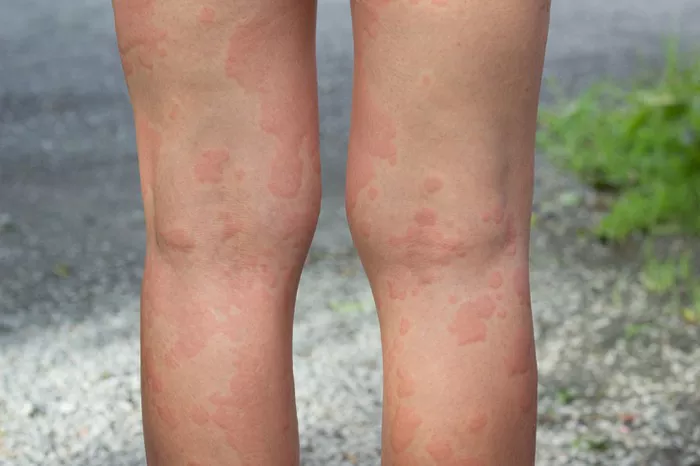Urticaria, commonly known as hives, is a skin condition characterized by red, itchy welts that can cause significant discomfort. While medications and lifestyle changes are primary treatments, certain dietary choices, particularly the inclusion of specific fruits, can play a supportive role in managing symptoms. This article delves into which fruits are beneficial for urticaria and the scientific reasons behind their efficacy.
Understanding Urticaria and Its Triggers
Urticaria occurs when the body’s immune system releases histamine and other chemicals in response to certain triggers. These triggers can be diverse, ranging from allergic reactions, stress, and infections to physical stimuli like pressure, temperature changes, and sunlight. Chronic urticaria, which lasts more than six weeks, often has unknown triggers, making management more challenging.
Dietary factors can influence urticaria, with some foods known to exacerbate the condition. Conversely, certain foods, particularly fruits with anti-inflammatory and antihistamine properties, can help mitigate symptoms. Here, we explore the best fruits to include in your diet if you suffer from urticaria.
1. Pineapple: The Bromelain Powerhouse
Pineapple is renowned for its high bromelain content, an enzyme with potent anti-inflammatory and antihistamine properties. Bromelain aids in the reduction of swelling and inflammation, common symptoms of urticaria. Moreover, it helps in the digestion of proteins, which can be beneficial if your urticaria is triggered by food sensitivities.
Studies have shown that bromelain can reduce the levels of prostaglandins and thromboxanes, compounds involved in the inflammatory process. By lowering these levels, bromelain helps in minimizing the severity of hives and accelerating healing.
2. Apples: Quercetin-Rich Allies
Apples, particularly their skins, are rich in quercetin, a flavonoid with strong antihistamine effects. Quercetin stabilizes mast cells, the cells that release histamine during allergic reactions. By preventing histamine release, quercetin can reduce the occurrence and severity of urticaria outbreaks.
In addition to quercetin, apples are also high in vitamin C, which further enhances their antihistamine and anti-inflammatory properties. Regular consumption of apples can help in managing urticaria symptoms more effectively.
3. Berries: Antioxidant Abundance
Berries, including strawberries, blueberries, raspberries, and blackberries, are packed with antioxidants, vitamins, and fiber. These fruits are particularly high in vitamin C and flavonoids, which possess anti-inflammatory and immune-boosting properties.
Vitamin C, an antioxidant, helps in reducing oxidative stress and stabilizing mast cells, thereby preventing excessive histamine release. The fiber content in berries also aids in maintaining a healthy digestive system, which can be crucial since gut health is linked to skin conditions like urticaria.
SEE ALSO: What Causes Itchy Hives on Body
4. Kiwi: The Vitamin C Powerhouse
Kiwi is another fruit exceptionally high in vitamin C, making it a great addition to the diet for urticaria sufferers. Vitamin C not only has antihistamine properties but also supports the immune system and helps in the repair of skin tissues.
Moreover, kiwi contains other beneficial compounds like vitamin E and polyphenols, which have anti-inflammatory effects. These properties collectively make kiwi a valuable fruit for reducing urticaria symptoms.
5. Citrus Fruits: Immunity Boosters
Citrus fruits such as oranges, lemons, limes, and grapefruits are well-known for their high vitamin C content. This vitamin is essential for its antihistamine effect, helping to reduce the frequency and intensity of allergic reactions.
Additionally, citrus fruits are rich in flavonoids and antioxidants, which support overall immune health and combat inflammation. Incorporating a variety of citrus fruits into your diet can provide a consistent supply of these beneficial compounds.
6. Papaya: Enzyme-Rich and Soothing
Papaya contains papain, an enzyme similar to bromelain in pineapples, which aids in digestion and reduces inflammation. Papain helps in breaking down proteins and can alleviate digestive issues that might trigger or worsen urticaria.
Papaya is also high in vitamin C and beta-carotene, both of which have antioxidant properties that support immune health and reduce inflammation. Consuming papaya regularly can help manage urticaria by minimizing inflammatory responses.
7. Watermelon: Hydration and Detoxification
Watermelon is not only refreshing but also hydrating, which is crucial for maintaining skin health and reducing the itchiness associated with urticaria. Proper hydration helps flush out toxins from the body, potentially reducing the frequency of hives.
Moreover, watermelon contains vitamins A, C, and B6, along with antioxidants like lycopene, which have anti-inflammatory properties. These nutrients support skin health and may help in preventing urticaria flare-ups.
8. Pomegranate: Anti-Inflammatory Properties
Pomegranate is another fruit rich in antioxidants, particularly punicalagins and anthocyanins, which have strong anti-inflammatory and antihistamine effects. These compounds help in reducing the severity of allergic reactions and inflammation associated with urticaria.
The high vitamin C content in pomegranate further supports immune function and helps stabilize mast cells. Regular consumption of pomegranate juice or seeds can aid in managing urticaria symptoms effectively.
Incorporating Beneficial Fruits into Your Diet
Incorporating these fruits into your daily diet can be simple and enjoyable. Here are some tips:
- Smoothies: Blend a mix of berries, kiwi, and pineapple for a refreshing and nutritious smoothie.
- Salads: Add slices of apple, orange segments, and pomegranate seeds to your salads for a flavorful and health-boosting meal.
- Snacks: Keep cut-up pieces of watermelon, papaya, and citrus fruits handy for quick and healthy snacks.
- Desserts: Use these fruits to make healthy desserts like fruit salads, sorbets, or yogurt parfaits.
Conclusion:
While fruits alone cannot cure urticaria, they can play a significant role in managing the symptoms and improving overall health. The anti-inflammatory, antihistamine, and immune-boosting properties of fruits like pineapple, apples, berries, kiwi, citrus fruits, papaya, watermelon, and pomegranate can help reduce the frequency and severity of urticaria flare-ups.
It’s important to remember that everyone’s body reacts differently to various foods. Therefore, it’s advisable to introduce new fruits gradually and observe how your body responds. Consulting with a healthcare provider or a dietitian can also help in creating a personalized diet plan that best suits your needs.
By making informed dietary choices and incorporating a variety of beneficial fruits, you can support your body’s natural defenses and manage urticaria more effectively.
Related Topics:

























